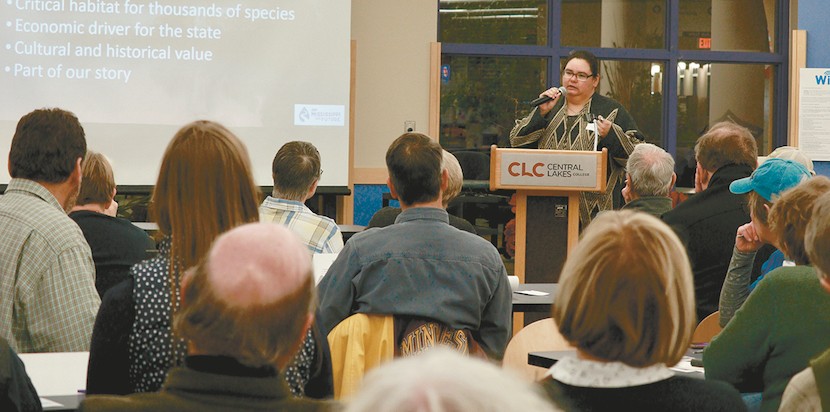
By Li Boyd Mille Lacs Band Member
Band member Li Boyd gave this speech at the Our Mississippi, Our Future community forum at Central Lakes College on December 5.
Aaniin. Mino-dibikak. Ningaabii'anikwe indizhinikaaz. Misi-zaaga'iganiing indoonjibaa. Awaazisi indoodem.
Hello. Good evening. Someone said I could come talk about water with you, but I only have five minutes, so buckle in.
My name is Li Boyd or West Woman in Anishinaabemowin. I come from Mille Lacs Lake and am a member of the Mille Lacs Band of Ojibwe. My clan is Bullhead. Our Mississippi, Our Future asked for my thoughts on water recently. I had a few to share. Luckily, a forum was provided, and this was the speech I made.
There are a lot of things I want to talk to you about: how our culture of convenience is killing us; how the scientific properties of water are what make life possible but also what make our material and resource choices so much more dangerous; the history of my home and people, and the people who came before; how our lake is so sacred that we first warred for it and then shared so much culturally that some of us even became one another; the dire threats that are creeping through our watersheds and the companies that wish to create even more without taking any responsibility for the damage they have already done; the system which has enabled corporations and profits to become more important than the basic survival of the natural world and therefore ourselves; how not all Indians are horse people — some of us are water people and have our jiimaan, our canoes, to get us around, and have had them long before Spanish Conquistadors ever brought horses to this land; and then everything… everything the world still doesn't know or acknowledge about what happened where the Cannonball River meets the Missouri River at a place called Standing Rock.
For this evening, though, I'm going to talk to you a little about language. I think many of us are here because we know that Water is Life. As Anishinaabekwe — an Anishinaabe woman — I will say that water not only is life, water also has life. Our Misi-ziibi — the Mississippi — our lakes and streams and each creek and pond around us is alive and has a Spirit. This is built into our very language through animacy.
Anishinaabemowin — the Anishinaabe language — is more than 80 percent verbs, as opposed to noun-heavy English, which is obsessed with identifying things in a static state separate from what they do. In the Anishinaabe world paradigm, verbs are the subject, and not only that, the form of the verb tells you whether what you are talking about is a living being or not, and that's what I mean by "animacy." So, the word for "river" in Anishinaabemowin is literally closer to "living-water flows" in translation.
Interestingly, water can be in an inanimate noun form, depending on context. Static water on the molecular level is not considered alive by many folks. However, in nature, we are never viewing water simply on a molecular level. We are viewing a lake, which can be calm or rough, or a river which may flow quickly or slowly, or rain that falls gently or stings, all things which are happening and which Anishinaabe credit with having life.
This is indigenous science and spirituality all in the same concept. Spiritually, we know that these things, rivers and lakes, are alive and have their own Manidoog — Spirits — that must be respected and honored. Scientifically, as Western culture would say it, we know that if we disrespect the Spirit in those waters by polluting it, altering its path, or using it without regard to whether it can replenish itself, the consequent effects can put the entire ecosystem out of balance chemically, biologically, hydrologically, geographically, and geologically. Our Traditional Ecological Knowledge is inextricably tied to our spiritual understanding of the world. For us, these are not conflicting concepts. In that respect, and in many others, Western science has still not caught up to us.
For me personally, with my balance of understanding between what is factual and practical and what is living life in a good way, it comes down to this: I live next to Misi-zaaga'igan — Mille Lacs Lake. I feel it ebb and swell with drought or rain, hear it move with the wind, and smell the changes within it. And, I live with a deep fear that one day it won't be alive anymore — the fish will all be gone, the trees will wilt on the shores, the water will be sickly and still, and the spirits will have abandoned the lake. Some days, that fear is so real I'm paralyzed by it.
Other days, I'm angry. Most days, though, I'm just determined to do everything I can to make sure that never happens. It's not about controlling nature. It's about having the integrity, courtesy, and respect to treat her the way she ought to and deserves to be treated. Nature has always provided for us — always! For us to come to a point in history where we refuse to prioritize her importance, especially when we don't have to continue to do harm, is utterly shameful. There are other, healthier ways of doing most things, almost all things. We need to commit, not only as individuals, but as communities, society, and governing bodies, to make necessary changes: Not to have a focus group about it for another 20 years… but to start acting now.
Just keep the Ojibwe language in mind as you look at the world around you. Look at the stones and the trees and really think: is this my relative? And consider how that might change your view. Miigwech.